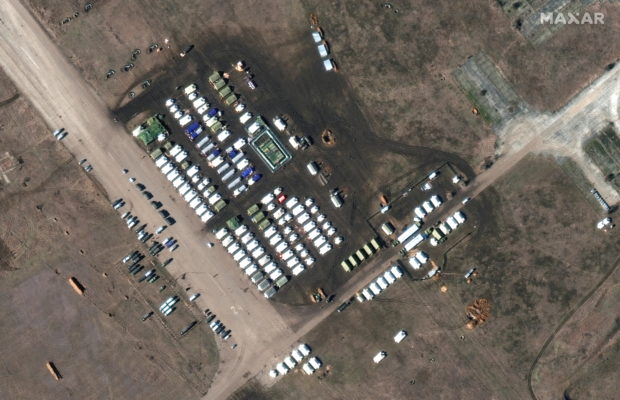US says more Russian troops mass near Ukraine, invasion can come at any time

A satellite image shows a close-up of troops and equipment at Oktyabrskoye air base, Crimea February 10, 2022. (2022 Maxar Technologies/Handout via REUTERS)
MOSCOW/ADELAIDE – Russia is massing yet more troops near Ukraine and an invasion could come at any time, perhaps before the end of this month’s Winter Olympics, U.S. Secretary of State Antony Blinken said on Friday.
Moscow, for its part, ramped up its truculent response towards a Western diplomatic push to defuse the crisis, dismissing answers sent this week by the EU and NATO to its security demands as an insult.
Commercial satellite images published by a private U.S. company showed new Russian military deployments at several locations near Ukraine.
In his starkest warning yet to Americans in Ukraine to get out now, President Joe Biden said he would not send troops to rescue U.S. citizens in the event of a Russian assault.
“Things could go crazy quickly,” Biden told NBC News.
Article continues after this advertisementBlinken, visiting Australia, told a news conference: “We’re in a window when an invasion could begin at any time, and to be clear, that includes during the Olympics.”
Article continues after this advertisementThe Beijing games end on Feb. 20.
“Simply put, we continue to see very troubling signs of Russian escalation, including new forces arriving at the Ukrainian border,” Blinken said.
Russia has already massed more than 100,000 troops near Ukraine, and this week it launched joint military exercises in neighbouring Belarus and naval drills in the Black Sea.
Moscow denies plans to invade Ukraine, but says it could take unspecified “military-technical” action unless a series of demands are met, including promises from NATO never to admit Ukraine and to withdraw forces from Eastern Europe.
The West has said those main demands are non-starters. The EU and NATO alliance delivered joint responses this week, saying their member states had agreed to speak as one. Russia’s Foreign Ministry said on Friday it had demanded an individual answer from each country, and called the collective response insulting.
“Such a step cannot be seen as anything other than a sign of diplomatic impoliteness and disrespect for our request,” the ministry said.
Several Western countries launched diplomatic pushes this week to persuade Russia to back down, but Moscow brushed them off, yielding no concessions to French President Emmanuel Macron who visited on Monday and openly mocking British Foreign Secretary Liz Truss who came on Thursday.
Four-way talks in Berlin between Russia, Ukraine, Germany and France, part of a longstanding peace process in a conflict between Ukraine and Russian-backed separatists, also yielded no progress on Thursday.
Paris and Kyiv said the Russian delegation had demanded Ukraine negotiate directly with the separatists, a “red line” Ukraine has rejected since the conflict began in 2014.
“If Ukraine agrees to this, then the status of Russia will change from being a party to the conflict to the status of being a mediator in the conflict. That is why we do not go for it,” Ukraine’s Foreign Minister Dmytro Kuleba said.
THE MUTE TALKING TO THE DEAF
U.S.-based Maxar Technologies, which has been tracking the buildup of Russian forces, said images taken on Wednesday and Thursday showed new deployments in western Russia, Belarus and Crimea, which Russia annexed in 2014.
The images could not be independently verified by Reuters.
Maxar identified 550 new troop tents and hundreds of vehicles at a Crimea airfield; extra troops, military vehicles and helicopters at an airfield in Belarus less than 25 km (15 miles) from the Ukraine border; and a large new deployment in western Russia around 110 km from the frontier.
Russia says it has the right to move forces around on its territory as it sees fit, and they pose no external threat.
Western countries have mostly stood together in threatening economic sanctions against Russia if it invades Ukraine, but have given conflicting views on the threat’s immediacy.
Washington and London have warned an invasion could come within days. British Prime Minister Boris Johnson called the coming days the most dangerous moment in Europe’s biggest security crisis for decades.
France’s Macron, by contrast, has said he thinks Russia does not have designs on Ukraine but wants changes to European security arrangements, and the existing Franco-German-led peace process for Ukraine’s separatist conflict provides a way out.
Whatever its intentions, Moscow has responded dismissively to Western pressure. Pictures of Macron seated far from Putin at the opposite end of a huge table in the Kremlin went viral on the internet this week, widely mocked.
The Kremlin said on Friday the distant seating was necessary because Macron had refused a COVID-19 test administered by Russian doctors. French officials said Macron’s travel schedule did not leave time to wait for test results; French sources also said Macron’s office was worried Moscow would sample his DNA.
Britain’s Truss was treated to a public upbraiding at a joint Moscow news conference by Foreign Minister Sergei Lavrov, who described their talks as a “conversation between a mute person and a deaf person”.
On Friday, Kremlin spokesman Dmitry Peskov cited an apparent gaffe by Truss – who was corrected by her ambassador after Lavrov referred to two Russian provinces that she took for parts of Ukraine – as evidence that Western governments were clueless.
A British official said Truss had simply misheard Lavrov. Peskov’s characterisation of the exchange was “total rubbish and classic Russian propaganda”, the official said.